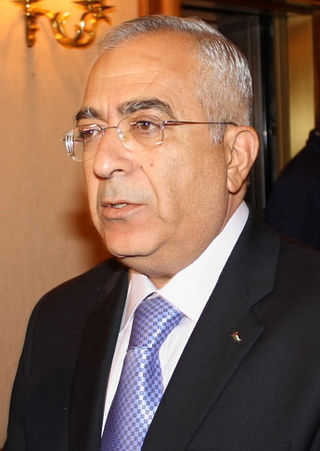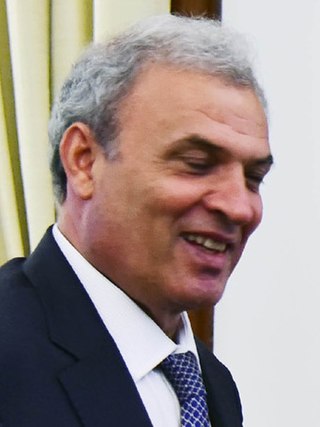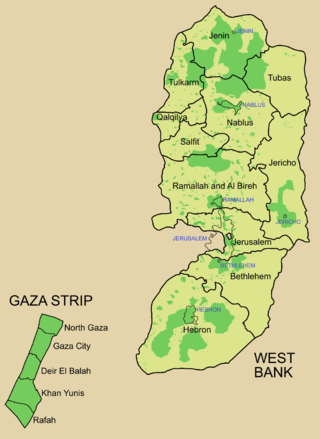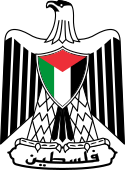
The Palestinian National Authority, commonly known as the Palestinian Authority and officially the State of Palestine, is the Fatah-controlled government body that exercises partial civil control over West Bank areas "A" and "B" as a consequence of the 1993–1995 Oslo Accords. The Palestinian Authority controlled the Gaza Strip prior to the Palestinian elections of 2006 and the subsequent Gaza conflict between the Fatah and Hamas parties, when it lost control to Hamas; the PA continues to claim the Gaza Strip, although Hamas exercises de facto control. Since January 2013, the Palestinian Authority has used the name "State of Palestine" on official documents, although the United Nations continues to recognize the Palestinian Liberation Organization (PLO) as the "representative of the Palestinian people".

The Palestine Liberation Organization is a Palestinian nationalist coalition that is internationally recognized as the official representative of the Palestinian people. Founded in 1964, it initially sought to establish an Arab state over the entire territory of the former Mandatory Palestine, advocating the elimination of the State of Israel. However, in 1993, the PLO recognized Israeli sovereignty with the Oslo I Accord, and now only seeks Arab statehood in the Palestinian territories that have been militarily occupied by Israel since the 1967 Arab–Israeli War.

Mahmoud Abbas, also known by the kunya Abu Mazen, is the president of the State of Palestine and the Palestinian National Authority (PNA). He has been the chairman of the Palestine Liberation Organization (PLO) since 2004, PNA president since January 2005, and State of Palestine president since May 2005. Abbas is also a member of the Fatah party and was elected chairman in 2009.
Rawhi Fattuh is the former Speaker of the Palestinian Legislative Council and was the interim President of the Palestinian Authority, following the death of Yasser Arafat on 11 November 2004 until 15 January 2005. Under Palestinian law, he was to hold the post for sixty days until an election was held. The elections were held and won by Mahmoud Abbas, who was sworn in on 15 January 2005. He was elected to the Central Committee of Fatah in December 2016.

Elections for the Palestinian National Authority (PNA) were held in Palestinian Autonomous areas from 1994 until their transition into the State of Palestine in 2013. Elections were scheduled to be held in 2009, but was postponed because of the Fatah–Hamas conflict. President Mahmoud Abbas agreed to stay on until the next election, but he is recognized as president only in the West Bank and not by Hamas in Gaza. The Palestinian National Authority has held several elections in the Palestinian territories, including elections for president, the legislature and local councils. The PNA has a multi-party system, with numerous parties. In this system, Fatah is the dominant party.

The Palestinian government is the government of the Palestinian Authority or State of Palestine. The Executive Committee of the Palestine Liberation Organization (EC) is the highest executive body of the Palestine Liberation Organization and acts as the government. Since June 2007, there have been two separate administrations in Palestine, one in the West Bank and the other in the Gaza Strip. The government on the West Bank was generally recognised as the Palestinian Authority Government. On the other hand, the government in the Gaza Strip claimed to be the legitimate government of the Palestinian Authority. Until June 2014, when the Palestinian Unity Government was formed, the government in the West Bank was the Fatah-dominated Palestinian government of 2013. In the Gaza Strip the government was the Hamas government of 2012. Following two Fatah–Hamas Agreements in 2014, on 25 September 2014 Hamas agreed to let the PA Government resume control over the Gaza Strip and its border crossings with Egypt and Israel, but that agreement had broken down by June 2015, after President Abbas said the PA government was unable to operate in the Gaza Strip.

Salam Fayyad is a Jordanian-Palestinian politician, who served as the prime minister of the Palestinian Authority and the finance minister.
The politics of the Palestinian National Authority (PNA) take place within the framework of a semi-presidential multi-party republic, with a legislative council, an executive president, and a prime minister leading the cabinet.

Ziad Abu Amr is a Palestinian politician, author, and member of the Palestinian Legislative Council. He currently serves as the first deputy prime minister and is a member (independent) of the PLO Executive Committee. From 18 March 2007 to 17 June 2007, he was Foreign Minister of the Palestinian National Authority. On 6 June 2013, Ziad Abu-Amr was appointed as Deputy Prime Minister of the Palestinian Authority by President Mahmoud Abbas.

The next Palestinian legislative election was scheduled for 22 May 2021, according to a decree by President Mahmoud Abbas on 15 January 2021, but was indefinitely postponed on 29 April 2021.

The president of the State of Palestine is the head of state of Palestine. Yasser Arafat became the first titular president of the State of Palestine in 1989, one year after the Palestinian Declaration of Independence. The title was originally titular, in parallel with the de facto title president of the Palestinian National Authority. Both functions were held by Arafat from 1994 and continued until his death in November 2004, and were continued by his successor Mahmoud Abbas. In January 2005, the Palestinian Central Council (PCC) asked Abbas to perform the duties of the president of the State of Palestine. In November 2008, the PCC approved the continuation of Abbas's function as president of the State of Palestine. Since 2013, the title president of the State of Palestine became the sole title of the Palestinian president.
The leaders of the Palestinian institutions are the leaders of the organs of the various Palestinian political entities - the Palestine Liberation Organization, the Palestinian National Authority and the State of Palestine.

The prime minister of the Palestinian National Authority was the position of the official head of government of the Palestinian Authority government, which operated between 2003 and January 2013, when it was officially transformed into the State of Palestine. Some still refer to the position of the prime minister of the Gaza Strip as the prime minister of the Palestinian National Authority.

The president of the Palestinian National Authority is the highest-ranking political position in the Palestinian National Authority (PNA). The president appoints the prime minister of the Palestinian National Authority, who normally requires approval of the Palestinian Legislative Council, and who shares executive and administrative power with the president.

The Chairman of the Palestine Liberation Organization, officially the Chairman of the Executive Committee of the Palestine Liberation Organization, is the leader of the Executive Committee (EC) of the Palestine Liberation Organization (PLO), the executive body of the PLO, which was established in 1964. The Chairman represents the PLO and the Palestinian people before the international community, including the United Nations. The Chairman is chosen by the members of the PLO EC. Since 29 October 2004, Mahmoud Abbas has been the Chairman of the PLO EC.

Legislative elections were held in the Palestinian territories on 25 January 2006 in order to elect the second Palestinian Legislative Council (PLC), the legislature of the Palestinian National Authority (PNA). The result was a victory for Hamas, contesting under the list name of Change and Reform, which received 44.45% of the vote and won 74 of the 132 seats, whilst the ruling Fatah received 41.43% of the vote and won 45 seats.

The Palestinian Legislative Council (PLC) is the unicameral legislature of the Palestinian Authority, elected by the Palestinian residents of the Palestinian territories of the West Bank and Gaza Strip. It currently comprises 132 members, elected from 16 electoral districts of the Palestinian Authority. The PLC has a quorum requirement of two-thirds, and since 2006 Hamas and Hamas-affiliated members have held 74 of the 132 seats in the PLC. The PLC's activities were suspended in 2007 and remained so as of November 2023, while PLC committees continue working at a low rate and parliamentary panel discussions are still occurring.

The prime minister of the State of Palestine is the head of government of the State of Palestine. The post has been in existence since January 2013, when the Palestinian National Authority was officially renamed into the State of Palestine and replaced the previous position of the prime minister of the Palestinian National Authority.

Ahmed Ali Mohammed Qurei, also known by his Arabic name kunyaAbu Alaa, was a Palestinian politician who served as the second Prime Minister of the Palestinian National Authority.

The Palestinian governments of 2013 were two Palestinian governments established respectively in June and September 2013. They ruled de facto over the West Bank only.












